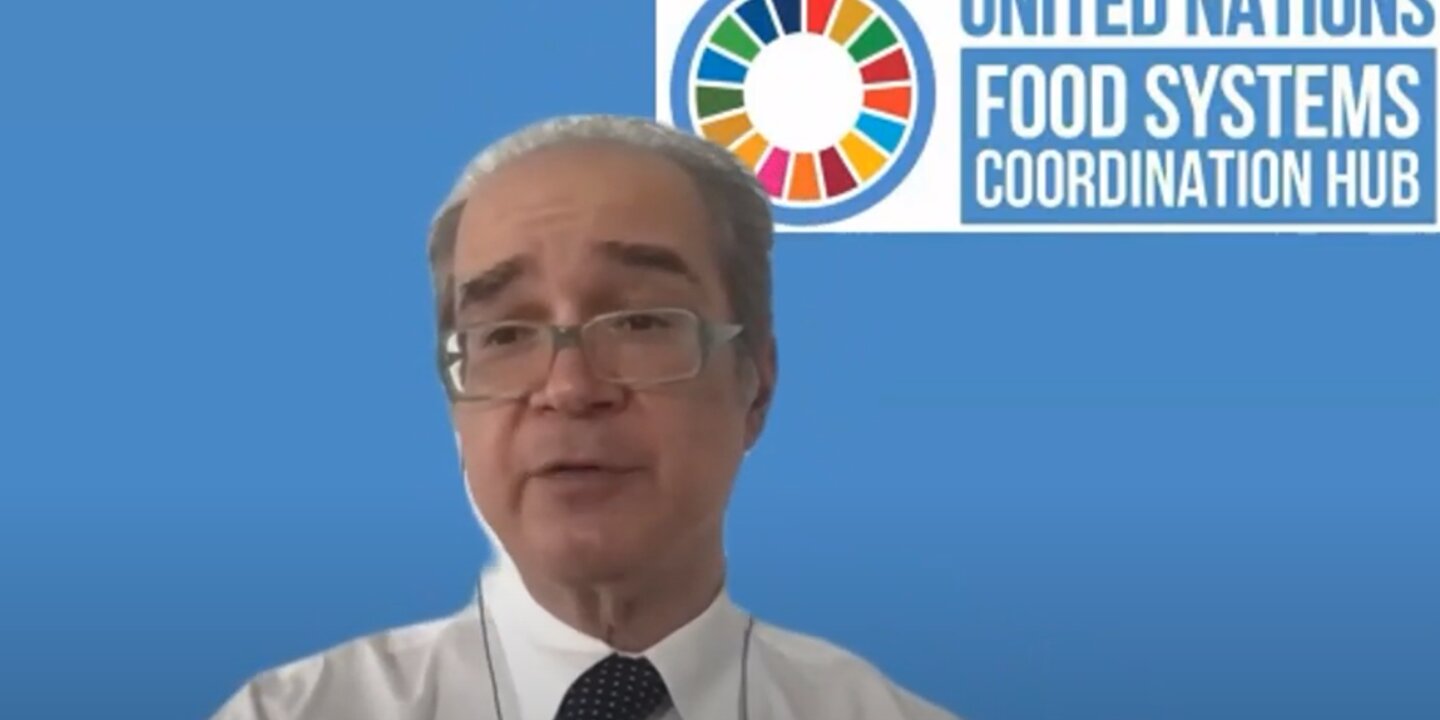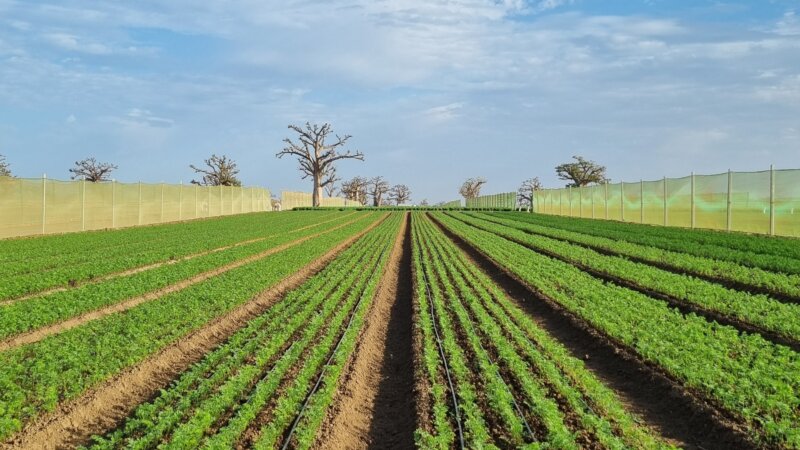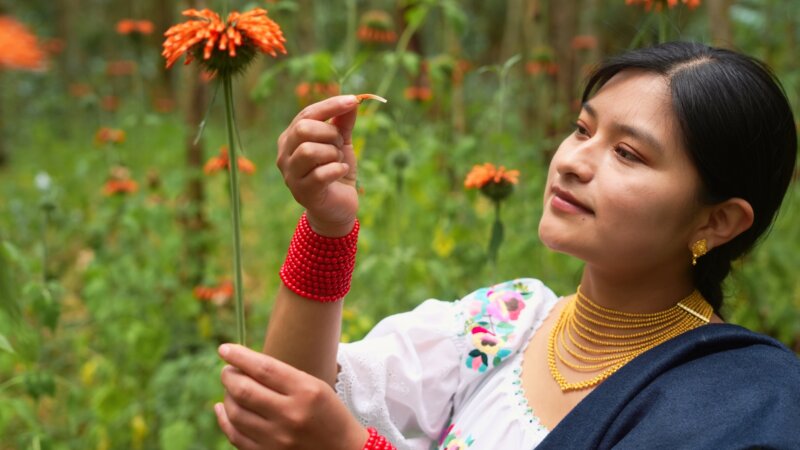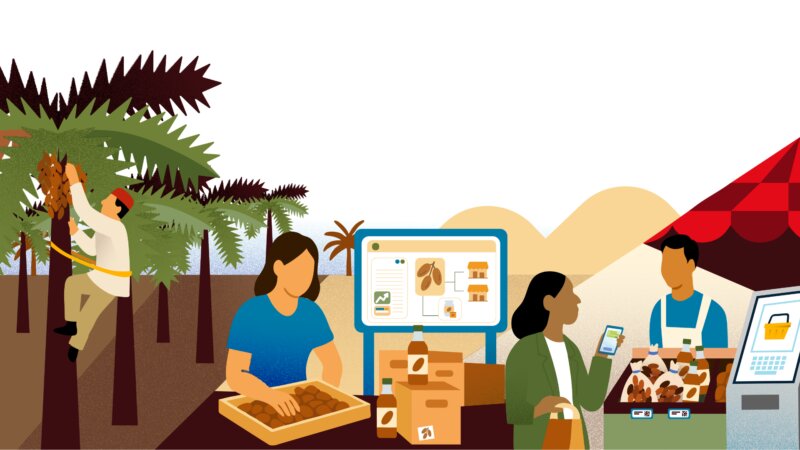As Stocktaking Approaches: Seizing the Moment

Dr. Fotiou, Coordinator UN Coordination Hub speeching during the network briefing
On June 29, NFP organised an online networking briefing for mutual sharing on the UNFSS +2 Stocktaking Moment. Key speakers included Dr. Stefanos Fotiou, director of the UN Food Systems Coordination Hub, as well as representatives from the Dutch Ministry of Agriculture, Nature and Food Quality, and the Ministry of Foreign Affairs. Dr. Walid Abed Rabboh (FoSTr, Jordan), Mrs. Mandira Neogi and Dr. Rudaba Khondker (GAIN Bangladesh), and Dr. Augustino Atillio (Ministry of Agriculture and Food Security) and Dr. Toni Nagalamu (University of Juba) from South Sudan, provided updates on progress in their countries' food system trajectories. Together, they offered valuable insights into their expectations for the upcoming UN meeting, which they consider as a moment for learning and dialogue, and as an opportunity to reach agreements needed to accelerate the implementation of national pathways for food system transformation.
During the lively discussion in this NFP network meeting, participants expressed genuine interest in the crucial role of a multi-stakeholder approach for effective partnerships in food systems transformation. They highlighted the need for a shared vision, policy coherence, government involvement, effective governance, financial resources, and inclusion of marginalised voices. Also participants stressed the importance of integrating business solutions with policy interventions and actively involving the private sector in discussions on food systems transformation.
Key messages:
-
The UN Food Systems Hub has released The UN SG report that summarises on the progress after the Food Systems Summit, analysis of direct inputs received through voluntary country progress reports from 101 countries, and dozens of actors of the Food Systems ecosystem of support, including coalitions of action, the UN System as well as other organisations. (updated after the online briefing)
-
During the Stocktaking Moment the SDG Trust Fund's special window specifically designed to bolster food system pathways will be launched. This dedicated initiative aims to allocate targeted resources towards national pathways.
-
Key representatives from Jordan, Bangladesh and South Sudan highlighted the importance of collaboration and multi-stakeholder involvement in developing national strategies and pathways for food systems transformation as well as having government ownership of a strategy to ensure resources and follow up action.
-
The Netherlands delegation expressed openness to learning from others and contributing as a key partner in ecosystems of support.
Seizing the moment to accelerate action towards FST
Dr. Fotiou, the Coordinator of the UN Coordination Hub, emphasised the importance of making the Stocktaking Moment (STM) a dynamic and productive event rather than a routine meeting. He highlighted the value of interactive sessions, inspiring panels, and engaging dialogues with the audience.
In addition he underlined, the focus is on actualising and accelerating existing commitments rather than introducing new ones. Implementation of the national pathways will be a central theme throughout the Stocktaking Moment, with dedicated sessions on finance, trade, digitalisation, and governance for implementation.
To facilitate implementation beyond the event, the UN deputy secretary general is expected to launch a food systems window within the UN SDG trust fund to garner support and resources from stakeholders, donors, and governments directly for countries and their national pathways. Dr. Fotiou's remarks underline the importance of driving tangible progress in the STM for food system transformation.
The role of youth
Youth representatives play a significant role within the stakeholder network of the UN FS coordination and the World Food Forum platform. Their input was actively sought to define their involvement in the Stocktaking Moment. Rather than hosting a distinct session exclusively for young participants, they proposed a more inclusive approach, advocating for the integration of youth representation throughout the event. On 29 June, therefore, the message to all participants, organising a side-event at the Stocktaking Moment, was to actively engage and include young people.
Progress on the national pathways
The response to the call for voluntary reports on national food systems pathways has exceeded expectations, with 101 out of 120 countries with a national pathway submitting reports. In addition, over 300 best practices and case studies were also provided by the various stakeholders, including those from the ‘ecosystem of support’ (including governments, NGOs, and UN system). The UN Food Systems Hub plans to publish a summary report on the progress on food systems transformation since the UN Food Systems Summit 2021. This report is based on the analysis of direct inputs received through voluntary country progress reports from 101 countries, and input provided by the actors of the Food Systems ecosystem of support. (update after the online briefing: the draft report has been published in the meantime (link to report))
The narratives being created for the report emphasise the central message that the work continued after the Food Systems Summit in 2021 and is significant and indicative of countries' commitment to food system transformation. During the session with the Dutch network, this was enforced by the leading food systems experts from Jordan, Bangladesh, and South Sudan who described how their respective countries have made advancements in developing and implementing their national food systems pathways. The key message from the speakers is the importance of collaboration and multi-stakeholder involvement in developing national strategies and pathways for food systems transformation. They emphasised the need to engage government policymakers, NGOs, INGOs, UN, research institutions, youth, farmers' associations, civil society, and academia in participatory dialogues to identify key issues and develop frameworks for transforming food systems. As well as the importance of convincing the government to acknowledge the necessity for a national strategy and resources for follow-up action. See for more information about the inspiring stories and progress in Jordan, Bangladesh and South Sudan in the boxes [below].
These stories from the national pathway development processes show that the plans are there and implementation is starting. Dr. Fotiou underscored the growing momentum stemming from the collective efforts of countries, with the aspiration to translate it into active and concrete dialogue in Rome to accelerate action.
UN Food Systems Summit +2 Stocktaking Moment
You can join the virtual programme which accompanies the event in Rome, Italy, from the 24th to the 26th of July, 2023.
Update by the Dutch delegation
Then it was time to answer the question on everyone's mind; what is happening in the Netherlands? The representative of the Dutch Ministry of Agriculture acknowledged the need for change in our domestic agrifood system. Especially with the agricultural agreement falling apart, uniting the different stakeholders poses a significant challenge. The Stocktaking Moment in Rome will be an opportunity to provide an update about the Netherlands and to share and learn from different experiences.
The Dutch Ministry of Foreign Affairs emphasised their commitment to food system transformation and highlighted their ongoing support for multi-year programs like FoSTr, promoting dialogue and implementation. The government actively participates in international coalitions of action related to seed, agroecology, food waste, zero hunger, healthy diets, and is exploring joining the food meals coalition. Additionally, the ministry is exploring the potential of the SDG trust fund window for food systems, to provide catalytic investments to support national pathways and implementation efforts.
The delegation shared an open invitation to the network members to feed the ministry with ideas and information to incorporate them in government policies and plans in the run-up to Rome.
In the broader context, the Stocktaking Moment seeks to promote convergence among stakeholders involved in food systems transformation, align their efforts with the broader SDG agenda and highlight the importance of effective implementation strategies. Dr Fotiou's speech highlighted another key objective of the Stocktaking Moment, which is to ensure consistency between food systems transformation and the broader goal of accelerating progress towards the Sustainable Development Goals (SDGs). Going forward, the aim is for the results of the STM to be taken to the SDG Summit in September, as well as to subsequent events such as the Climate Change Conference (CoP 28) and the 2024 Summit of the Future, building on ongoing work and promoting sustainable cooperation, integration and alignment with other global processes for sustainable development.
Jordan
-
1.6 million people with insufficient food consumption (WFP Hungermap)
2021 was announced as the year for food resilience and food system transformation in Jordan. In fact it turned out to be just the start of continued work on food system transformation in the country. Dr. Walid Abed Rabboh, Country, facilitator FoSTr Jordan, explained that several major achievements occurred of which the development of the first national food security strategy was the most important. A national pathway was established in follow up to the UNFSS. And despite the national law not to establish new entities, the government established a new council for food security and a special trust fund for food security. This shows the recognition that is being given by the government for food system transformation. Currently a food systems transformation roadmap is being developed and is being put forward for approval by the government. Jordan has been working on putting the infrastructure in place for food systems transformation. More challenging will be to put the wagons on the track and start implementation. The roadmap will identify the priorities and where to put the financial resources.
The FoSTr (Foresight for Food Systems Transformation), has been very helpful in the process towards food systems transformation. Dr Walid explained there are a lot of unknowns in the food systems, which need to be addressed in order to be able to plan for transformation. For example, around food loss and waste, further knowledge is needed on where the waste happens and how to prevent it . FoSTr is helping to understand synergies and put in place a framework on how to value and evaluate financially, environmentally and socially to make it saleable and palatable for decision makers in government but also the private sector for making transformations.
Bangladesh
-
41.1 million people with insufficient food consumption (WFP Hungermap)
Mrs. Mandira Neogi , Project Manager Policy & Food Systems at GAIN Bangladesh, started her presentation by stating that the effectiveness of UNFSS commitments in Bangladesh was attributed to the implementation of a multistakeholder approach. The government of Bangladesh actively included NGOs, INGOs, UN, research and youth throughout the process in dialogues, informing policy making and defining a national pathway.
Bangladesh has developed a third country investment plan to ensure a sustainable and nutrition sensitive and resilient food system, for which regular monitoring of the implementation is put in place through adapting the global food systems dashboard to Bangladesh. Another notable post summit achievement is the development of the Dhaka Food Agenda 2041 to make Dhaka’s food system more inclusive, resilient, and sustainable looking even beyond 2030.
Throughout the process focus has been on linking the different policy documents and commitments as well as stakeholders to create policy coherence. Mandira Neogi emphasised the significance of recognizing the interconnectedness between food systems, nutrition, and resilience, and of addressing issues with a holistic perspective, in order to meet the commitments under UNFSS.
GAIN will organise a side event during the Stocktaking Moment: Policy to practice: Bangladesh’s approach towards integrating food systems with nutrition and resilience
TIME: 13:30-14:30 (CET)
ROOM: Iran
South Sudan
-
4.8 million people with insufficient food consumption (WFP Hungermap)
Dr. Augustino Atillio (Ministry of Agriculture and Food Security, South Sudan) and Tony Ngalamu (University of Juba), joined the briefing to share about their experiences. They used their presentation to take the audience along South Sudan's journey towards food systems transformation. They explained that in 2021 they started to identify outcomes and key drivers and opportunities within the country to support the efforts towards food system transformation.
The process used participatory and inclusive dialogues, discussing with farmers associations, civil society, academia, government policy makers to identify the key issues which are affecting the food system. These dialogues have been instrumental in identifying key priorities and coming up with the pathways and framework for transformation. In addition, it has been crucial that the government has joined the dialogue and now is owning the process and committing resources and capacities.
In South Sudan, the decentralised level process is of key importance. States are being specifically targeted in the food systems transformation efforts. State actors in South Sudan are showing a growing willingness to collaborate with stakeholders and donors to address key food insecurity challenges. This engagement from the states is crucial in building momentum and achieving strong governance systems for food systems transformation (FST).
With the support of the universities of Wageningen and Juba, efforts were started for seed systems transformation focusing more on locally procured and produced seeds. These efforts have gained momentum and garnered attention from stakeholders, starting to shift the focus from humanitarian aid to development and encouraging commitment to building food systems resilience.
Authors

Ruth van de Velde
Partnership Builder

Nicole Metz
Senior Knowledge Broker - Netherlands Food Partnership




